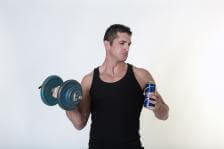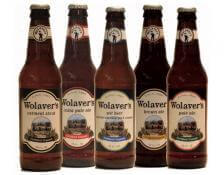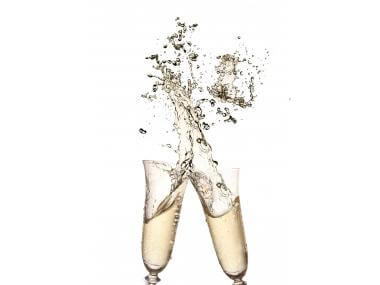Can You Drink Beer After Exercise?
A cold brew can be a great way to finish off a sports activity or intense workout. But can it also damage your health? Are there beers that are actually good for that post-workout thirst? Get-Fit Guy gets to the bottom of the glass.

Sponsor: This episode is brought to you by NatureBox. Discover smarter snacking with a new NatureBox each month. Get 50% off your first box when you go to NatureBox.com/qdt.
As my fellow Quick and Dirty tips host the Nutrition Diva points out in her article Is Drinking Alcohol Good For You? moderate alcohol consumption is certainly good for your heart and reduces your risk of heart disease and stroke by thinning the blood and reducing inflammation. Alcohol also seems to reduce the risk of many other diseases.
But what about when it comes to exercise? Today, you’re going to discover if beer is good for workouts, if you should drink beer after exercise, and if beer can actually improve hydration.
Should You Drink Beer After Exercise?
Earlier this year, a Canadian beer company concocted a low-alcohol form of beer that they packed with protein and marketed as a “fit beer.” It’s called Lean Machine and was created by a team of food scientists at Vampt. With only 77 calories and 0.5% alcohol by volume, it’s also enriched with nutrients, antioxidants, and electrolytes to “help replenish the body after a good workout.”
The Lean Machine inventors may actually be onto something. In a study published in International Journal of Sports Nutrition and Exercise Metabolism, it was discovered found that beer’s potential dehydrating effect could be mitigated by changing its electrolyte content. By lowering the level of alcohol 2.3% and then adding salt, researchers found that the electrolyte-enhanced, lower-alcohol beer hydrated their sample of athletes better than traditional ale.
Bear in mind that they were simply comparing this new modified beer to traditional beer – and this certainly doesn’t mean the modified beer performed any better than, say, water, a sports drink, or milk.

But there may still be other benefits to beer. Since beer is plant-based and contains barley, hops, and yeast, this means that it also contains a wide range of naturally occurring nutrients that chemically manufactured, super-sweet, nutrient-void sports drinks may not have.
For example, a 2011 German study found that polyphenols in beer may assist with immune function during prolonged strenuous exercise. In this study, participants who were given a non-alcoholic beer (yes, non-alcoholic!) every day for 3 weeks before and 2 weeks after their marathon reported fewer incidences of upper respiratory tract infections and were up to 3 times less susceptible to the common cold. This is likely due to compounds found in plants that contain anti-inflammatory and anti-oxidative effects.
So ultimately, with a little bit of carbohydrate, some added electrolytes, low amounts of alcohol, and some smart engineering to add protein, beer may actually be helpful after exercise. But of course, how many of us are drinking non-alcoholic, fancy, fit beer at the finish line of a marathon?
The Downside to Alcohol and Exercise
There are definitely negatives to mixing booze and exercise. For example, high amounts of alcohol intake can impair protein synthesis, which is exactly how your muscles repair themselves after exercise. This was found in a study published earlier this year in PLoS One. In practical terms, this means chugging a few beers after, say, a triathlon, may lead to slower recovery for your shoulder or knee muscles.
The study also revealed that when athletes binged on alcohol after an intensive strength-training workout, their protein synthesis decreased by nearly 40% – but these athletes were doing a lot of drinking – roughly 8 shots of vodka mixed with orange juice over a 3-hour period!
The good news is that there is no evidence I’m aware of to show that alcohol in moderation (such as a single beer or a glass of wine) is going to cause this same effect. So bottoms up – but not too many!
What Kind of Beer Is Healthy?
Unfortunately, just like many processed foods, beer can have some definite disadvantages in the health department. Here’s some harmful ingredients that are commonly found in beer:
GMO Corn Syrup
- GMO Corn
- High Fructose Corn Syrup
- Fish Bladder
- Propylene Glycol
- Monosodium Glutamate (MSG)
- Natural Flavors
- GMO Sugars
- Caramel Coloring
- Insect-Based Dyes
- Carrageenan
- BPA
Newcastle, Budweiser, Corona, Miller Lite, Michelob, Guinness, Coors Light, and Pabst are some of the biggest offenders!
When it comes to finding healthy beer, I recommend you find a microbrewery that you can trust – one that relies upon healthy, organic, naturally-sourced ingredients. The ones who reveal their ingredients proudly are your best bet.
Organic beers that are unpasteurized and unfiltered include:
Wolaver’s – all beers
- Lamar Street – Whole Foods label (brewed by Goose Island)
- Bison – all beers
- Dogfish Head (organic when ingredients are available)
- Fish Brewery Company – Fish Tale Ales
- Lakefront Brewery – Organic ESB
- Brooklyn – (organic when ingredients are available)
- Pinkus – all beers
- Samuel Smiths – Samuel Smiths Organic Ale
- Wychwood – Scarecrow Ale
You can read more details on how to choose healthy beer in the excellent article 8 Beers You Should Stop Drinking Immediately, and if you have questions about drinking beer after exercise, then join the discussion over at Facebook.com/GetFitGuy.
Bodybuilder with beer image courtesy of Shutterstock; Wolaver’s image courtesy of Esquire.



 GMO Corn Syrup
GMO Corn Syrup Wolaver’s – all beers
Wolaver’s – all beers



